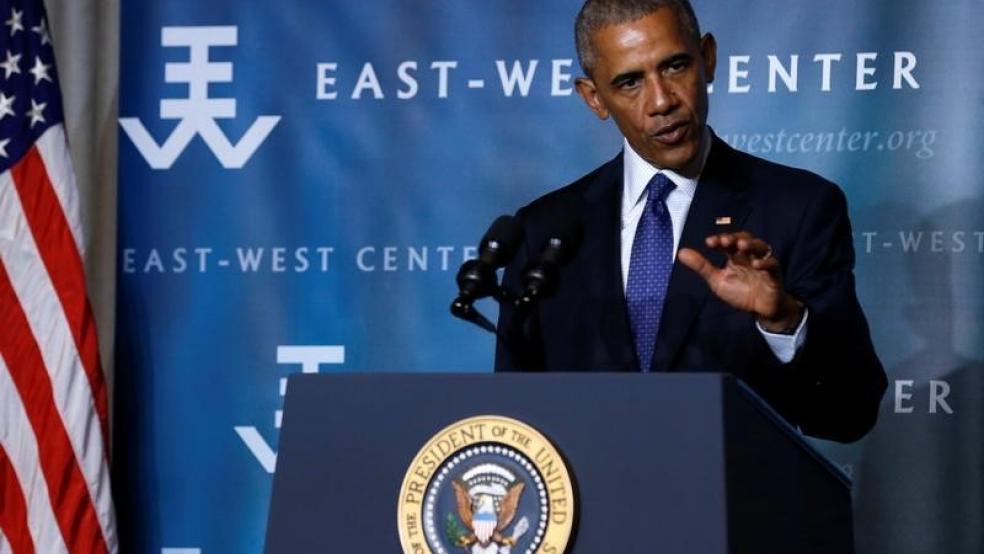Perhaps it’s a factor of Hillary Clinton’s consistent lead over Donald Trump in both national polls and in expert assessments of the likely breakdown of the electoral vote in November’s presidential election. Or perhaps President Obama has simply decided that there is a line he will not cross when it comes to supporting his preferred successor. But whatever the cause, the president showed once again this weekend that even in the face of opposition from his own party’s presidential nominee, he is not going to budge on the question of the Trans-Pacific Partnership trade deal.
The TPP, a massive agreement between a dozen nations around the Pacific Rim, has become a political football in the United States. Donald Trump, the nominee of the pro-trade Republican Party, has called the agreement a “disaster” and said that he would scrap it and pursue bilateral deals backed by the threat of steep tariffs against countries that don’t agree to arrangements that favor the US.
Related: Austrian Economy Minister Adds His 'Nein' to US Trade Talks Debate
Clinton, who faced a dogged primary challenge from strident TPP-critic Vermont Sen. Bernie Sanders, came out against the deal last year, despite both a history of pro-trade positions and having advocated for the deal during her time as Secretary of State.
The country now faces an election where the choices are a candidate from the president’s party who will likely work to preserve the policy changes he has implemented over the past eight years and a GOP candidate who has vowed to eradicate them, root and branch. It’s at least arguable that the smart move by a president looking to preserve the greatest percentage of his legacy would be to give Clinton a little leeway on TPP -- but that’s not the path Obama chose in an interview with CNN’s Fareed Zakaria that aired Sunday morning.
Two of the main arguments against the agreement from the left have been that it will disadvantage American workers in favor of laborers in foreign countries and that its environmental protections are inadequate.
“What this does is, it raises the standards for trade so that there is greater protection for labor rights, a greater protection for environmental rights, greater transparency, greater protection for intellectual property, which is so important to a knowledge-based economy like ours,” Obama told Zakaria.
Related: Obama’s Big Trade Deals May Never Get Done
“It removes 18,000 taxes, effectively, tariffs,” he continued. “Because we're a relatively open market and many of our trading partners the[re] have been closed, it gives us a huge lever to open up markets for American goods and services.”
He didn’t stop at advocating for the deal. The president went after its critics, which includes the woman he presumably wants to succeed him in the Oval Office.
“[T]here’s no serious economist who hasn't looked at this and said this is actually not only a smart trade deal, but it actually makes up for some of the failures of previous deals to have fully enforceable labor or environmental components.”
Obama added, “I remain confident that we can get TPP passed.”
Obama did concede that there are legitimate concerns about global trade deals, but he argued that they are mostly about managing the effects on the margins rather than about addressing any fundamental unfairness.
Related: 7 of Hillary Clinton’s Biggest Flip-Flops
“[T]he combination of globalization and automation have integrated the world economies like never before,” Obama said. “And what I think has been the fault of those in charge of that integration process has been to not pay attention to the winners and the losers.”
Global trade, he said, is “part of the reason that we've seen billions of people rise out of extreme poverty during our lifetimes.”
So, bottom line, not only is Clinton not getting any political cushion from Obama on TPP -- she’s going to have to deal with pushback from an increasingly popular president.
“The argument I make to my progressive friends is you are absolutely right to worry about inequality, but the answer is not to pull up the drawbridge,” Obama concluded. “The answer, rather, is to make sure that everybody has high labor standards, that all countries are accountable to their citizens in terms of things like minimum wages, workers' standards, making sure that there's an education system that people can access.”





